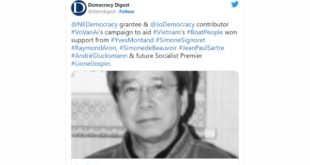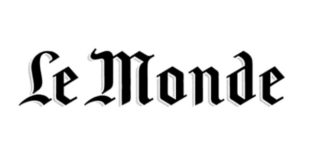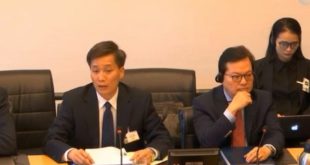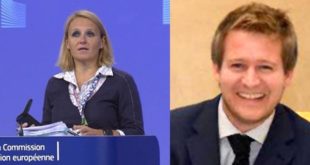HANOI, Nov 26, 2004 (dpa) – The Unites States ambassador to Vietnam expressed his concern Friday at Vietnam’s treatment of two high-profile Buddhist dissidents.
The leaders of the Unified Buddhist Church of Vietnam (UBCV) have been under de facto house arrest, since a run-in with communist authorities last October, according to the International Buddhist Information Bureau (IBIB), the information arm of the UBCV.
This week Thich Quang Do, the deputy leader of the organization, was prevented from visiting patriarch Thich Huyen Quang, who was hospitalized last week.
“We are aware of the fact that his (Thich Huyen Quang’s) deputy Thich Quang Do has not been allowed to visit him,” Ambassador Michael W. Marine told reporters. “We have made it clear in various conversations that this is very hard to understand.”
Ambassador Marine had a brief meeting with 87-year-old leader of the UBCV earlier this week, he said.
Over a year ago, immediately following the run-in with authorities, Vietnam’s press spokesman said the pair would face charges of “carrying state secrets,” but since then no official charges have been made, the IBIB said Friday.
“Were the government to press charges, we would call for transparency in the process so that we and others can understand what the charges are all about and so that these individuals can receive whatever legal protections are possible under Vietnamese law,” Ambassador Marine said.
Le Dung, Vietnam’s press spokesman, failed to respond when asked by fax over a week ago whether the men would be facing charges.
The UBCV is not recognized by the communist government, and the two leaders have spent most of the last 20 years either in prison or under house arrest.
During Marine’s first two months as ambassador, one issue that has come up with Vietnamese officials, is the U.S. State Department decision in September to designate Vietnam as a “country of particular concern” (CPC) for its record on religious freedom.
“The Vietnamese unhappiness and disagreement with our decision to designate them a CPC certainly comes up, but that’s usually part of the dialogue as to why that decision was made and what steps could be taken by Vietnam to cause us to reverse that decision,” Ambassador Marine said.
A range of punitive measures could be applied to Vietnam as a result of the state department ruling, but these measures have yet to be decided, the ambassador said.
Despite differences over religious freedom and human rights, trade relations between the former foes continue to develop and will be a significant part of the new ambassador’s work, he said.
“U.S. business is not yet here in the way I would like to see it here,” Ambassador Marine said. “I would like to see more opportunity and I would like to convince Vietnamese officials and business entities to ‘think American’ more than they do now.”
Following the signing of a Bilateral Trade Agreement between the two countries in 2001, the U.S. has become Vietnam’s biggest trading partner.
Earlier this year, a the U.S. International Trade Commission ruled that Vietnam had been “dumping” – selling catfish on the U.S. market at unfairly low prices. Next month a similar ruling on Vietnamese shrimp is expected.
Despite these hiccups in trade relations, the U.S. fully backed Vietnam’s wishes to join the World Trade Organization as soon as possible, the ambassador told foreign and Vietnamese journalists.
Full diplomatic relations were only re-established between the two countries just under a decade ago, and there was room for improvement in relations, the ambassador said.
dpa st jh
 Quê Me Quê Me: Action for democracy in Vietnam & Vietnam Committee on Human Rights
Quê Me Quê Me: Action for democracy in Vietnam & Vietnam Committee on Human Rights




